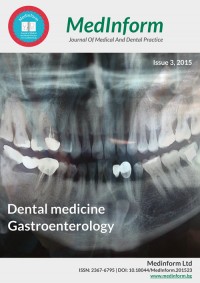Issue Three 2015
2015, Vol. 2, issue 3, (November)
Literature Review
Chronic Periodontitis and Rheumatoid Arthritis – Microbiological Aspects
Abstract:
An overview of the literature on the role of periodontopathogenic microorganisms and chronic periodontitis in the emergence and development of rheumatoid arthritis is presented. The paper discusses the microbiological and genetic factors, environmental factors and the pathogenesis of the two diseases and presents evidence for the relationship between them. Porphyromonas gingivalis, associated with the severity of chronic periodontitis is the only microorganism documented to produce peptidylarginine deiminase (PAD), involved in the process of citrullination. P. gingivalis infection may generate citrullinated peptides, which trigger anti-cyclic citrullinated peptide (anti-CCP) antibodies against synovial lining of the joints. Citrullination by human PADs is important in normal physiology and inflammation. Porphyromonas gingivalis has not been detected in all investigated patients with rheumatoid arthritis and hasn`t been associated with the titer of rheumatoid factor / anti-cyclic citrullinated peptide (anti-CCP) antibodies. Probably in the process of citrullination another microorganism that will be shown in future studies takes an active role. The emphasis is placed on Anaeroglobus geminatus, which is associated with the titer of rheumatoid factor / anti-CCP antibodies and detected in all patients studied. The presence of Leptotrichia and Prevotella spp. only in patients with new-onset rheumatoid arthritis is highlighted.
Authors:
Elka Popova; Department of Periodontology and Oral mucosal diseases, Faculty of Dental Medicine, Medical University – Plovdiv;Liliya Kavlakova; Department of Periodontology and Oral mucosal diseases, Faculty of Dental Medicine, Medical University – Plovdiv;
Mariya Panchovska; Department of Propaedeutics of Internal Diseases, Medical University - Plovdiv, Bulgaria;

